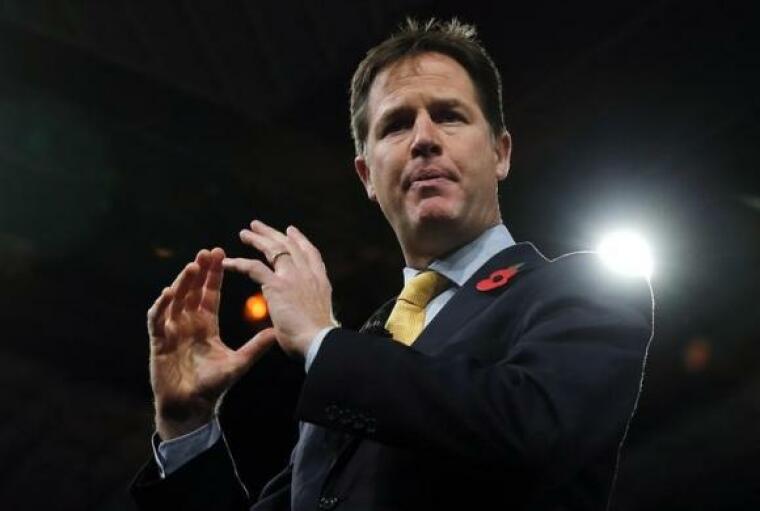Anti-Suicide Program In U.S. Could Be Adopted By Hospitals In U.K

U.K. Deputy Prime Minister Nick Clegg has called for a revamp in how the National Health Service (N.H.S.) handles suicides, urging hospitals to adopt a successful approach in Detroit in a mission to end such.
"Suicide is preventable, it is not inevitable," the deputy prime minister was quoted by BBC as saying. "We have to break this hidden assumption that nothing can be done to stop people killing themselves."
In England alone, more than 4,700 people committed suicide in 2013, an increase of more than 6 percent compared to the previous year.
"Suicide is one of the biggest killers of men under the age of 50 and if this was a physical health problem, there would be a national outcry."
The cited approach was established by the Henry Ford Medical Group in Detroit in 2001. The medical group's wide-ranging program included enhanced staff training and increased contact with patients. It also involves giving better education to families of people who are considered at risk to suicide.
Suicide rate among Henry Ford's patients dropped by 75 percent, and by 2008, suicides among patients have been stopped, the BBC reported.
Following Henry Ford's victory, Merseycare NHS Trust in Liverpool is starting a similar scheme which will create Safe from Suicide Team, a 24/7 group of experts who will assess patients with suicidal thoughts and improve the care of people with self-harm injuries.
The team has also been tasked to offer therapies on the spot and to follow up with people when they return home.
A safety plan for each person will also be developed, as pattern from Henry Ford's approach.
"Everything about that individual, their risk, their tendencies, everything we know should be incorporated into that safety plan, so that any professional that comes into contact with them can understand better what to do next," said Joe Rafferty, chief executive of the trust, as quoted by BBC.
It is expected that there will be a drop in the number of patients who commit suicide within 18 months, according to Dr. David Fearnley, medical director at the trust.
 Christians don't have to affirm transgenderism, but they can’t express that view at work: tribunal
Christians don't have to affirm transgenderism, but they can’t express that view at work: tribunal Archaeology discovery: Medieval Christian prayer beads found on Holy Island
Archaeology discovery: Medieval Christian prayer beads found on Holy Island Presbyterian Church in America votes to leave National Association of Evangelicals
Presbyterian Church in America votes to leave National Association of Evangelicals Over 50 killed in 'vile and satanic' attack at Nigerian church on Pentecost Sunday
Over 50 killed in 'vile and satanic' attack at Nigerian church on Pentecost Sunday Ukrainian Orthodox Church severs ties with Moscow over Patriarch Kirill's support for Putin's war
Ukrainian Orthodox Church severs ties with Moscow over Patriarch Kirill's support for Putin's war Islamic State kills 20 Nigerian Christians as revenge for US airstrike
Islamic State kills 20 Nigerian Christians as revenge for US airstrike Man who served 33 years in prison for murder leads inmates to Christ
Man who served 33 years in prison for murder leads inmates to Christ


 Nigerian student beaten to death, body burned over ‘blasphemous’ WhatsApp message
Nigerian student beaten to death, body burned over ‘blasphemous’ WhatsApp message 'A new low': World reacts after Hong Kong arrests 90-year-old Cardinal Joseph Zen
'A new low': World reacts after Hong Kong arrests 90-year-old Cardinal Joseph Zen Iran sentences Christian man to 10 years in prison for hosting house church worship gathering
Iran sentences Christian man to 10 years in prison for hosting house church worship gathering French Guyana: Pastor shot dead, church set on fire after meeting delegation of Evangelicals
French Guyana: Pastor shot dead, church set on fire after meeting delegation of Evangelicals ‘Talking Jesus’ report finds only 6% of UK adults identify as practicing Christians
‘Talking Jesus’ report finds only 6% of UK adults identify as practicing Christians Mission Eurasia ministry center blown up in Ukraine, hundreds of Bibles destroyed: 'God will provide'
Mission Eurasia ministry center blown up in Ukraine, hundreds of Bibles destroyed: 'God will provide' Church holds service for first time after ISIS desecrated it 8 years ago
Church holds service for first time after ISIS desecrated it 8 years ago Burger King apologizes for 'offensive campaign' using Jesus' words at the Last Supper
Burger King apologizes for 'offensive campaign' using Jesus' words at the Last Supper Uganda: Muslims abduct teacher, burn him inside mosque for praying in Christ’s name
Uganda: Muslims abduct teacher, burn him inside mosque for praying in Christ’s name